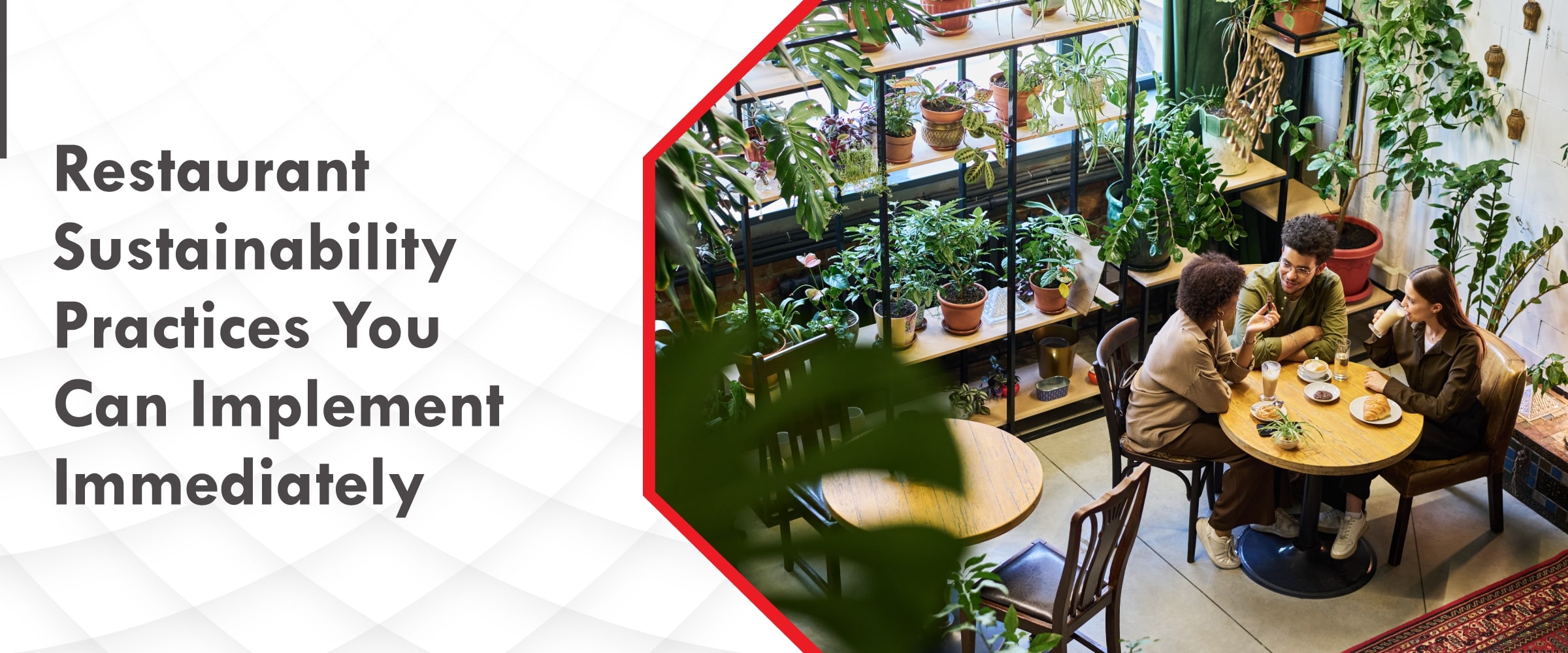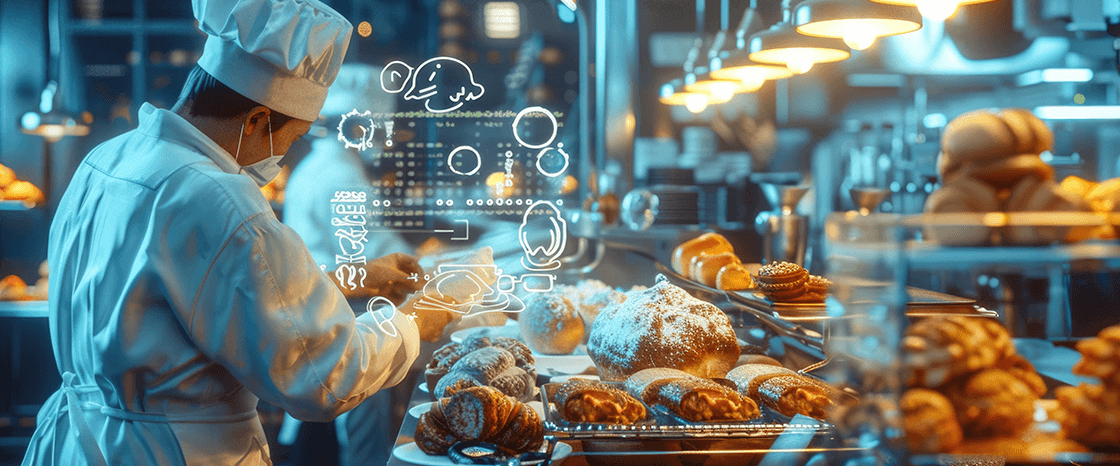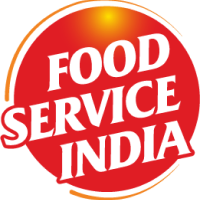
Best Restaurant Sustainability Practices: An Efficient Guide
Consider a hypothetical scenario in which you have run out of options for providing value to your customers. How would you adapt and evolve your business in order to meet their needs? This is a fundamental question that every restaurant manager and owner should address.
Amidst the climate crisis sustainability has become one of the most prioritised goals for every sector, including restaurants. Sustainability refers to the wise use of resources to meet the needs of today without compromising the future.
Incorporating sustainable practices into your restaurant’s daily operations is not only the correct choice morally, but also from a business perspective. As the world becomes increasingly aware of the negative effects of climate change, customers are seeking restaurants with sustainable practices. Customers, especially younger customers are holding restaurants accountable for their business practices.
This blog aims to give you a brief idea of restaurant sustainability practices, current trends, and how Food Service India Pvt. Ltd. can help you achieve your sustainability goals.
A] Importance Of Sustainability In The Restaurant Industry
The restaurant industry is a significant contributor to the climate crisis. It is guilty of large quantities of CO2 emissions, food and water wastage, plastic pollution, and several other hazards. This puts a lot of stress on the environment, threatening sustainability. This is unacceptable in an era where ideas like sustainability and environmental balance are held in the highest regard.
Amidst this, customers are demanding restaurants to be more environmentally friendly. Adopting sustainable practices in restaurants can not only help the environment but also improve customer satisfaction and food quality. Below are some facts that help us drive this point home.
B] Restaurant Sustainability Trends In 2024
Take your restaurant’s sustainability to the next level—buy our horeca services today!
- There is a high demand for vegetarian and vegan menu options as the meat industry is responsible for about 60% of the carbon emissions.
- Customers are looking for ethically sourced food options, i.e. raw materials that do not disturb the biodiversity.
- Younger generations are willing to pay a higher price for ethically sourced food and sustainable practices.
- There is a huge emphasis on the packaging of food and beverages.
- Patrons are more likely to take home their leftovers rather than let them go to waste.
C] Exploring The Various Restaurant Sustainability Practices
1. Source Local And Seasonal Ingredients

One of the unnoticed contributors to carbon emissions in the restaurant industry is the transportation of raw materials. Sourcing ingredients like fruits, vegetables, and grains from local markets can reduce the carbon emissions caused during transportation. Additionally, using locally sourced and seasonal products can ensure freshness and improve the taste of a dish.
FSIPL helps restaurants adopt sustainable practices by sourcing local ingredients whenever possible. We, as a reputed food products supplier, complement these efforts by providing high-quality, shelf-stable culinary solutions like dehydrates and canned foods, reducing transportation emissions. Our expertise in menu development also helps restaurants create seasonal offerings to highlight fresh, local produce.
2. Reduce Food Waste

Food waste is one of the top issues in the restaurant industry. Reducing the amount of food wasted can not only reduce the strain on the environment but also have a positive impact on your profitability. The first step to reducing food wastage is to track it. Getting the exact amount of food wasted per dish or customer can allow the kitchen staff to manage portion size.
Another means to reduce food wastage is to use every part of the raw material and buy perishable products in moderation. Food Service India Pvt. Ltd., understands the impact of food wastage on the business. Our pre-cut, pre-measured, and pre-portioned products like syrups, spices, marinades, sauce premixes, seasoning powder, and gravy mixes, make it easier for chefs to reduce food wastage.
3. Energy Efficiency

Lighting and air conditioning are an important part of creating a comfortable environment for your customers. However, you could adjust how much electricity you use, lowering your overall energy expenses as well as carbon emissions. Restaurants can reduce their energy consumption by installing energy-saving appliances.
Ensure your restaurant has efficient ventilation and exhaust systems, reducing the load on air conditioners. Incorporating smart appliances that sense and adjust their energy consumption is also a viable option. FSIPL specialises in optimising backend processes and can identify areas for energy savings, and train the staff to power down unused areas.
4. Water Conservation

Water conservation is a big part of becoming a sustainable restaurant. Reducing the wastage of water lowers your water bill. It also reduces the pressure on wastewater management plants. While this may not seem like much, it can add up in the long run.
Here are some methods you can use to conserve water:- Proper maintenance of taps and faucets.
- Train employees to turn off taps and report leaks.
- Ask customers if they would like drinking water, instead of always offering it.
- Optimise dishwashers if used.
5. Sustainable Packaging

Packaging is the second most important sustainability issue in restaurants, other than food wastage. The problem occurs when restaurants deliver take-out orders in single-use plastic containers. These containers often find their way to landfills, creating a ton of plastic pollution. One way to tackle this problem is to reduce the number of plastic containers used for deliveries and take-outs.
Alternatively, restaurants can invest in biodegradable, recyclable, and reusable containers, which helps reduce plastic pollution. Switching to sustainable packaging improves brand reputation and even leads to more customers coming in.
6. Plant-Based Menu Options

As briefly mentioned above, the meat industry is one of the largest contributors to carbon emissions. As a result, more and more individuals are shifting towards vegetarian and vegan diets. Having a plant-based menu allows you to cater to a wider audience. A plant-based menu is also highly sustainable compared to meat and dairy options.
Food Service India helps restaurants and chefs create a bespoke plant-based menu for the target market. Our team of experts curate and expand your menu using ingredients available in your locality and are easy to cook. Ensuring the chef and cooks are comfortable cooking the new menu further helps your plans to become a sustainable restaurant.
7. Waste Recycling

Recycling is one of the easiest ways to incorporate sustainability into your restaurant’s daily operations. Recycling waste can look different for different people. Some can use leftover parts of food such as vegetable peels, stalks, and other unused parts for soups and stews. Others could start or join a compost program to ensure kitchen waste does not go to dumps.
Having a waste recycling and composting program in place can reduce your carbon footprint. Food Service India plays an important role in establishing a standard procedure for recycling. Our staff training program also emphasises the importance of recycling.
8. Continuous Improvement

Sustainability is a continuous process that requires evaluation and adjustment according to changing circumstances. With Climate change one needs to be aware of the latest trends and practices, which will help them build a sustainable restaurant business.
One way to always stay updated on current sustainability trends is to join a sustainability club or project. Of course, Food Service India will always be by your side to guide and help you in your quest for sustainable practices.
Further Reading:
Reduce meat on the menu
Meat production and consumption are one of the biggest contributors to greenhouse emissions. Reducing the consumption of meat is a green solution to this problem. Restaurants can help tackle this problem by reducing the number of meat dishes on the menu or introducing meat-free menus.
Offering plant-based alternatives can reduce your carbon footprint by almost 60%. FSIPL helps businesses design a new menu in accordance with ingredients available in local markets, consumer tastes, and the restaurant’s themes.
Use eco-friendly cleaning products
Many cleaning products found in today’s restaurants are often filled with harmful chemicals, harsh acids, and microplastics. While these products may be convenient, they pollute the environment and contribute to ecological degradation.
Many cleaning products companies provide eco-friendly alternatives that are just as economical and accessible without compromising on the environment. Switching to these brands can help keep your sewage cleaner. It is also a good idea to train your kitchen staff to use the products correctly and with cleaning techniques.
Employee training and engagement
Educating and training staff on the importance of water and electricity conservation can help to reduce resource wastage. You must also provide clear instructions on leftover food management. Training employees to be part of your sustainability drive and engaging them with the cause reduces your work by almost 50%. Employees may also bring new ideas to the table improving your efficiency.
Launch a program for composting
Every restaurant must have a composting program regardless of if they are trying to be more environmentally friendly or not. Kitchen waste that goes to the landfill would decompose in itself producing methane, a common greenhouse gas.
Composting programs help restaurants be more environmentally friendly while also helping the local community. Restaurants must sort food scraps, coffee grounds, vegetable peels, and other compostable materials and send them to local composting facilities.
Conclusion
Sustainability is more than just a trend in the restaurant industry, it is an effort to protect the environment. Modern customers expect the food they are served to be ethically sourced and not harm the environment. The sustainability tips mentioned in this blog allow restaurants to become more environmentally inclined and sustainable.
Of course, Food Service India is always here to help your business grow. As one of India’s leading HoReCa distributors, we understand the importance of shifting towards a sustainable future. Our experts have the experience and insight to implement sustainable practices customised to your restaurant’s needs. Reach out to us today for a greener future.





